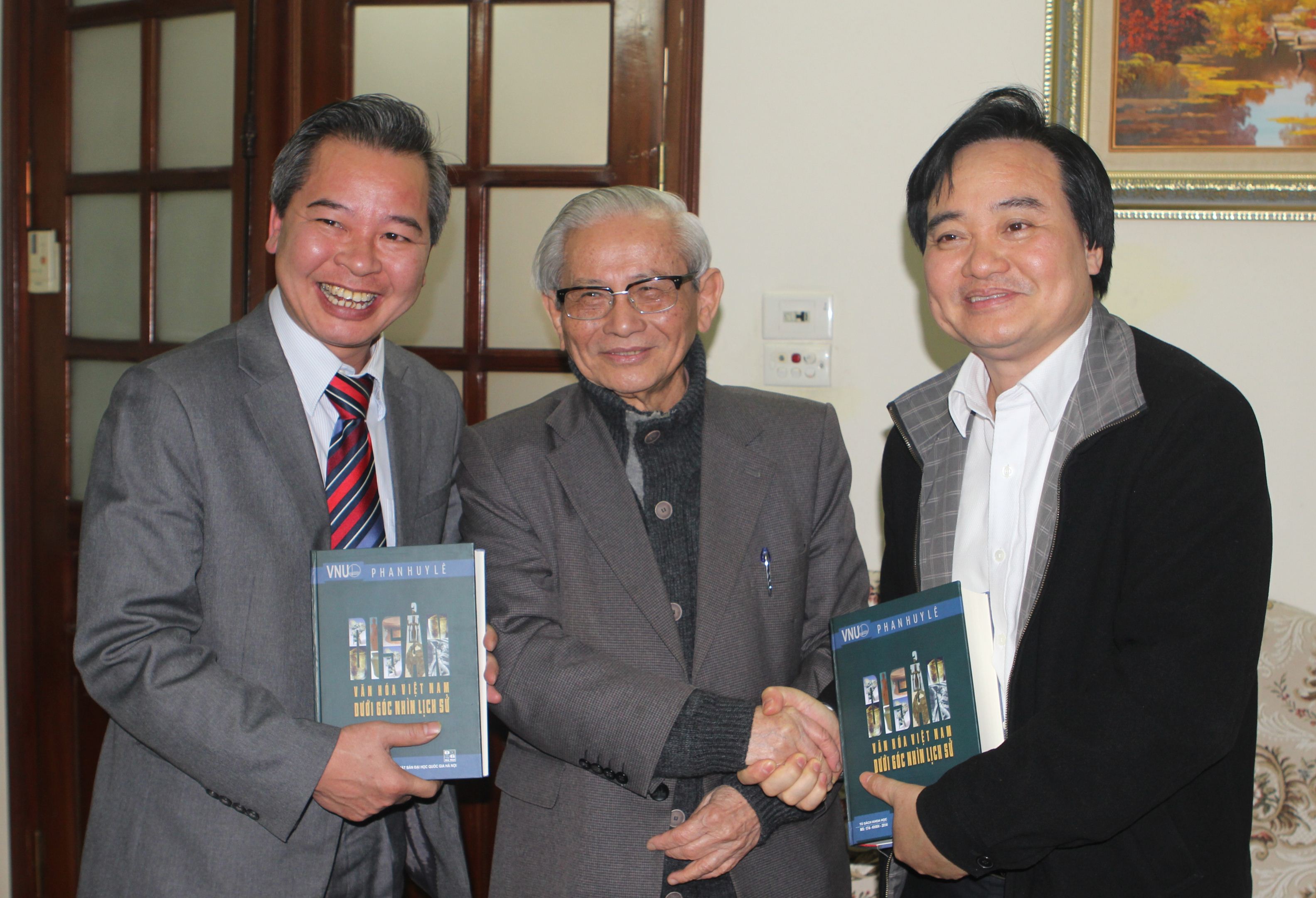
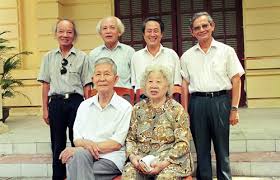
From left to right: The four pillars of History including Professor Tran Quoc Vuong, Professor Dinh Xuan Lam, Professor Ha Van Tan, Professor Phan Huy Le take a photo with Professor Tran Van Gia and his wife.
In 1952, at the age of 18, Phan Huy Le left his family to study at the University Preparatory School in Thanh Hoa and here he had the opportunity to meet the leading revolutionary intellectuals of the country. Being a gifted student with a passion for natural sciences, he planned to choose Mathematics - Physics for his future career, but it seemed that fate had predetermined for him the path to become a Historian. Professor Tran Van Giau and Professor Dao Duy Anh were the first to recognize Phan Huy Le's qualities and directed him to study at the History - Geography Department, Hanoi Pedagogical University.
In 1956, Hanoi University was established with 4 faculties: Mathematics - Physics, Chemistry - Biology, Literature and History. Phan Huy Le, who had just graduated with a bachelor's degree in History - Geography, was immediately accepted into the Ancient History Group of the History Faculty under the direct guidance of Professor Dao Duy Anh. Right from his studies, he was trusted by his teachers to be a teaching assistant. After graduating, he not only officially taught classes but was also assigned by Professors Tran Van Giau and Dao Duy Anh to write lectures and undertake the tasks of real experts. Perhaps that is why, only 2 years later, when Professor Dao Duy Anh transferred to the Institute of History, at the age of 24, he was firmly in charge of the responsibility of a Head of the Department, spearheading the organization and development of a major that holds a key position in the system of subjects in Vietnamese social sciences.
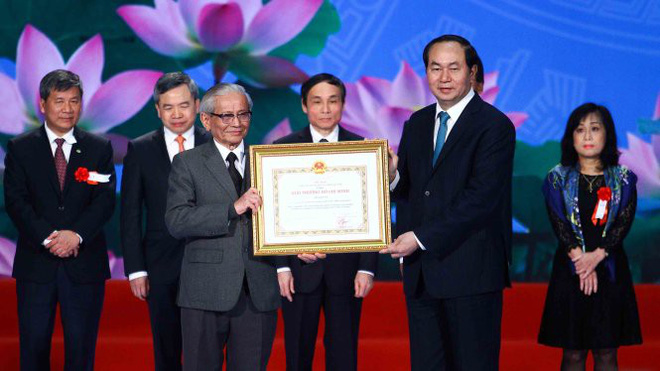
Prof. Dr. Phan Huy Le received the Ho Chi Minh Prize for Science and Technology in 2016.
Entering the history profession, Phan Huy Le considered the socio-economics as the foundation of all history. Our country is an agricultural country, so the study of traditional Vietnamese socio-economics cannot but start from the countryside, agriculture and farmers. This explains why the first publications in his scientific career wereLand regime and agricultural economy in the early Le dynasty(1959),Characteristics of the Tay Son peasant movement(1959),Labor and employment in Vietnamese feudal society(1959)… There were 5 major works in the first 5 years of his career in the economic and social fields.
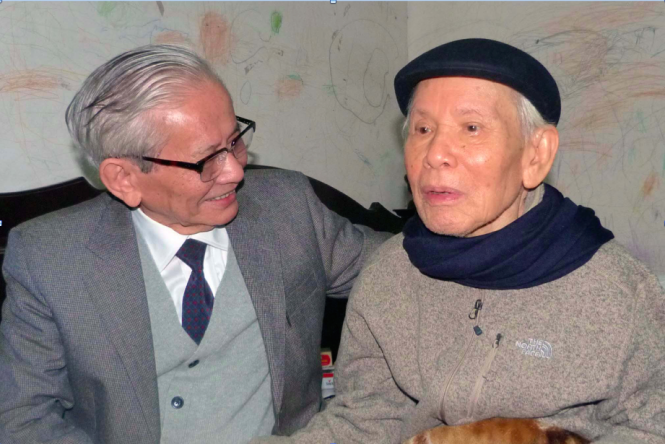
Professor Phan Huy Le and Professor Dinh Xuan Lam
When Phan Huy Le had just established his position in socio-economic research, the US imperialists escalated their bombardment of the North. Aware of his civic responsibility to participate in the nation's struggle, Phan Huy Le turned to research on resistance wars against foreign invaders and major battles in history. His worksLam Son Uprising(1965);The tradition of building and defending the country of the Vietnamese people(1973),Some strategic battles in national history(1976),Bach Dang victory in 938 and 1288(1988)... were completed under such conditions and have become typical works of military history.

Prof. Dr. Phan Huy Le and Prof. Phung Xuan Nha (former Director of VNU) and Prof. Pham Quang Minh (Rector of the University of Social Sciences and Humanities, VNU)
After the liberation of the South and the reunification of the country, Phan Huy Le continued to devote much of his heart to the topic of fighting foreign invaders. In about 15 years (1975-1989), he wrote over 24 major works, not to mention dozens of articles and discussions on this topic. When talking about Phan Huy Le, people immediately think of the leading expert on the history of fighting foreign invaders with an outstanding number of research works and with profound summaries that directly contributed to the common achievements of the country. In this topic, he has 50 out of 408 completed works (accounting for 12.2%).
However, what Phan Huy Le was always particularly interested in were the issues of socio-economics, socio-economic forms and socio-political institutions in pre-modern Vietnamese history. Whenever he had the opportunity, he took the opportunity to return to the topic of land regime, agricultural economy, farmers and traditional villages. The number of works he wrote specifically on socio-economics was 51 (accounting for 12.5%), of which the most typical were works written on the Tay Son peasant movement, books and special topics on the development of socio-economic forms, socio-economic structures, and villages of the Vietnamese in the Northern Delta region... In addition, he was always a pioneer in exploiting related sources of documents such as land registers, royal records, genealogies... combined with field surveys.
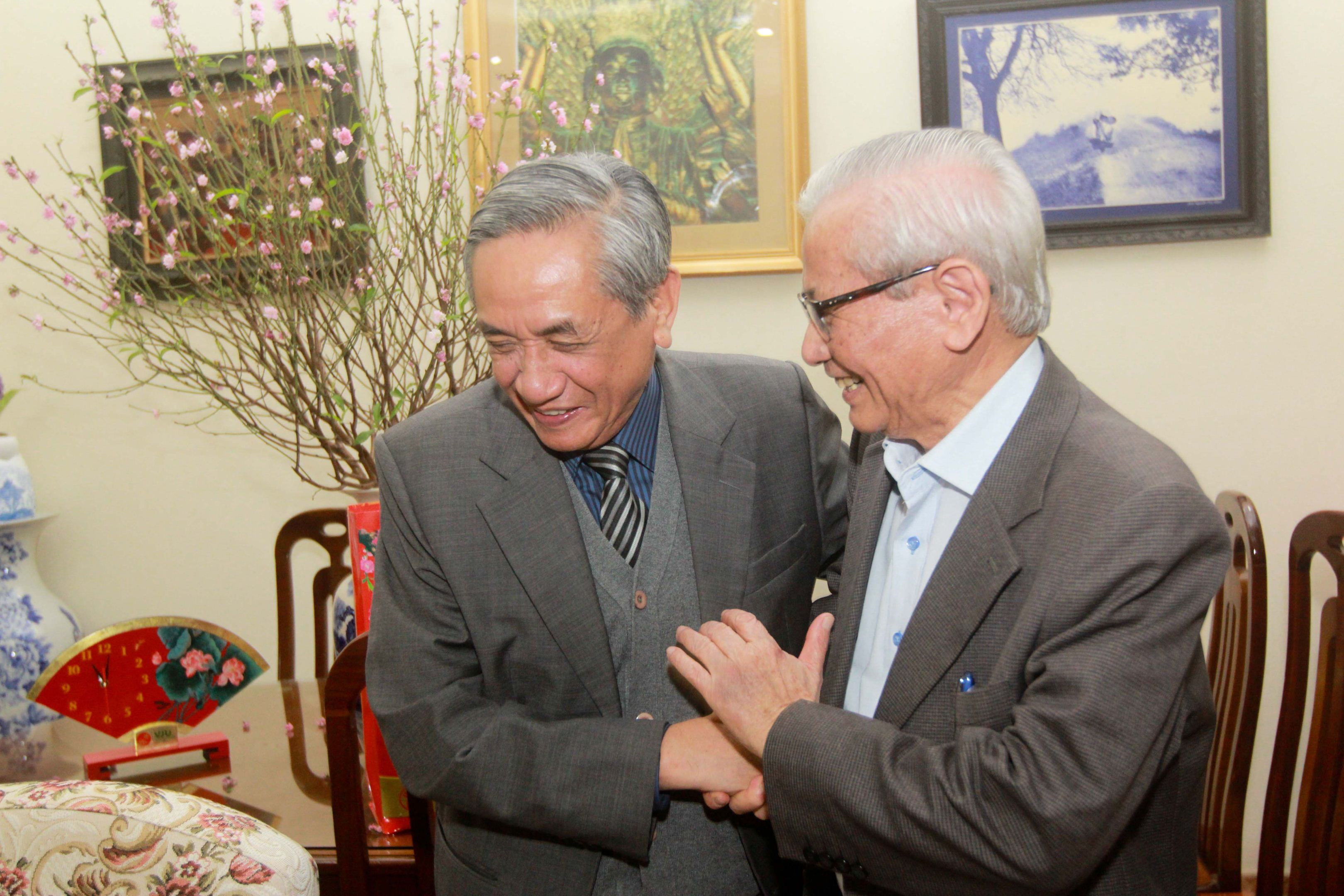
Professor Phan Huy Le and Professor Vu Duong Ninh
Phan Huy Le began to expand his research into the field of culture and tradition from the mid-1970s and his interest in this field became increasingly comprehensive with an average number of 64 (accounting for 15.72%). Typical works are:Tradition and Revolution(1982),The issue of democracy in Vietnamese tradition(1988),Traditional values and Vietnamese people today(3 episodes, 1994, 1996, 1997),Vietnamese patriotism, traditional and modern(2002) and a system of articles on the cultural heritage of the Thang Long Imperial Citadel Central Heritage...
It can be imagined that all of Professor Phan Huy Le's works are divided into 7 main areas, with the number of works ranging from 41 to 92 (average 58) for each area. However, the greatest responsibility placed on Professor Phan Huy Le is not for each specific historical section but for summarizing the history of the country. As early as 1959, that is, when he first started writing the first manuscript pages, he had a collection of lecturesHistory of Vietnam from 1406 to 1858. Two years later, he launchedHistory of Vietnamese feudal regimeVolume II (1960) andHistory of Vietnamese feudal regimeVolume III (1961), contributing to the stature of the Faculty of History. In 1971, he and Tran Quoc Vuong wroteHistory of VietnamVolume I, is considered the first general history book of the new regime. During this time, a series of other lectures and textbooks onHistory of Vietnamwas born (in 1966, 1970, 1978...) as the basis for the appearanceHistory of VietnamVolume I (1983) - a book summarizing the history of Vietnam from the primitive period to the 10th century, relatively complete and up-to-date. Especially recently, in the independent scientific topic at the State level, the book series was built.History of Vietnam4 volumes, Professor Phan Huy Le is both the editor and main author of volumes I and II, considered the highest summary of the historical period from its origin to the mid-19th century.
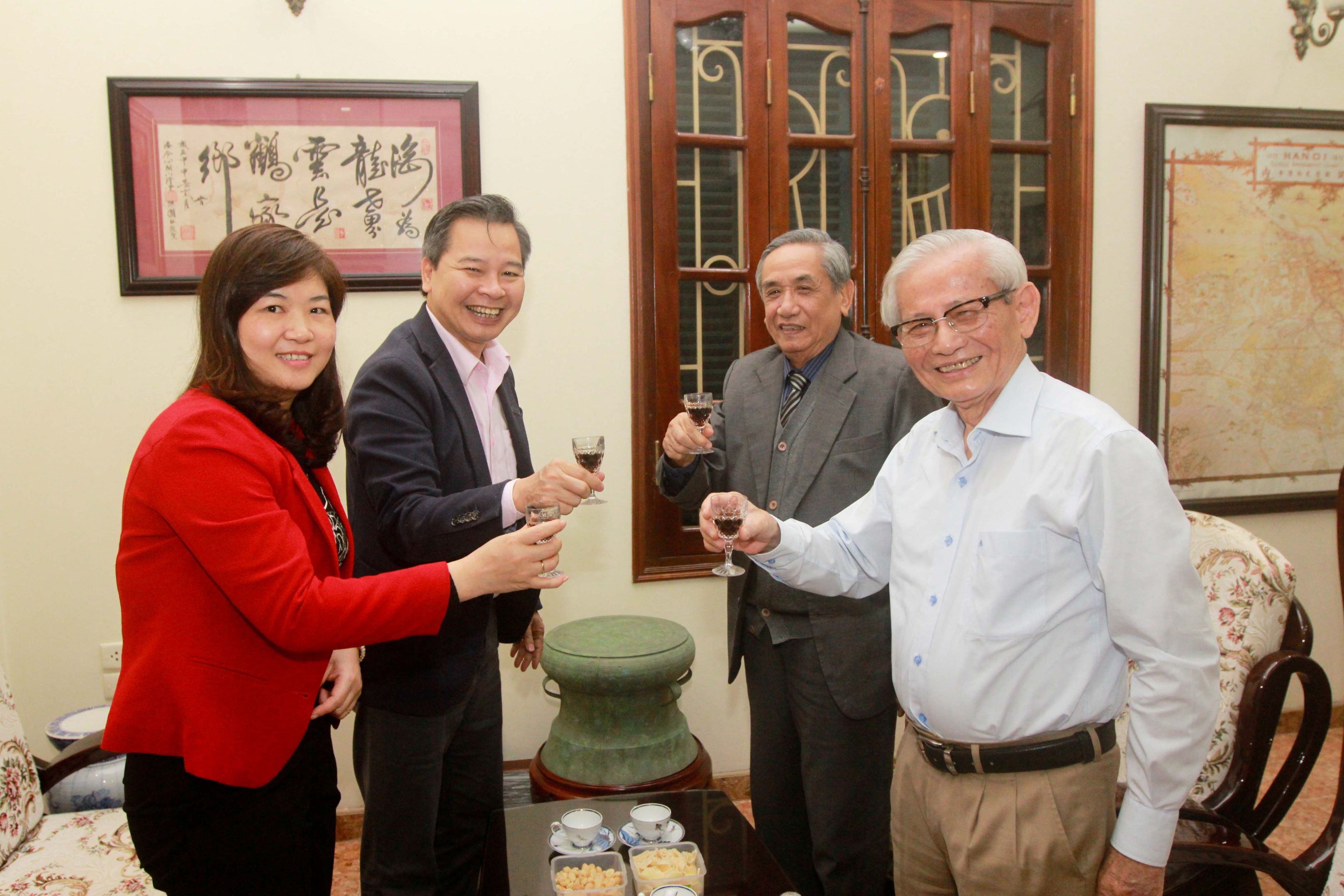
Leaders of the University of Social Sciences and Humanities congratulated Professor Phan Huy Le at his home
Not only did he devote himself to writing general histories and textbooks, Phan Huy Le was also the author of many local history works. Respecting and promoting traditional history writing experience, he was also the pioneer in modernizing and updating new research methods. The number of historical summaries, lectures, textbooks and general histories of his high level therefore reached 41 works (accounting for 10.0%), creating perfection and superiority in the qualities and personality of Phan Huy Le as a historian.
The erudition in Professor Phan Huy Le's historical works stems from the noble responsibility of a teacher, because according to him, teaching at university is teaching the results of one's own research.
Over the past half century, in addition to teaching at the Faculty of History, he has also taught many classes inside and outside the Hanoi National University, universities around the world, such as the University of Paris VII (France), the University of Amsterdam (Netherlands)... Thousands of students he has trained, many of whom have become successful, holding important positions in research and teaching institutions at the central and local levels, domestically and internationally. He is also one of the first experts of the new Vietnamese education system to participate in teaching specialized topics, guiding and reviewing domestic and international graduate students, including 17 of his direct students who have successfully defended their doctoral and scientific doctoral theses.
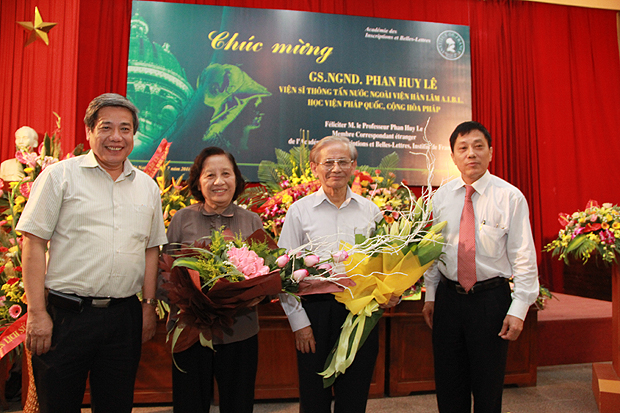
Prof. Phan Huy Le with Prof. Mai Trong Nhuan (former Director of VNU) and Prof. Vu Minh Giang (former Vice Director of VNU)
In addition to the task of training History, he was also assigned the responsibility of building two new fields of study: Oriental Studies and Vietnamese Studies. From 1988 to the present, Professor Phan Huy Le has continuously been the President of the Vietnam Historical Science Association. He also holds key leadership positions or is a member of many National Councils such as the National Council for directing the compilation of the Encyclopedia Dictionary, the National Council for Science and Technology Policy, the Central Council of Theory, the Council of Science and Training of Hanoi National University, the Council of State Academic Titles, the Council of Ho Chi Minh Awards and State Awards, the National Cultural Heritage Council... In every position, he has made outstanding contributions.
He was awarded the title of Professor (1980), Meritorious Teacher (1988), People's Teacher (1994); was awarded the Second Class Resistance Medal (1985), the First Class Labor Medal (1998), Second Class (1994), Third Class (1974); was awarded the State Prize (2000), the International Asian Cultural Prize of Fukuoka, Japan (1996), the Academic Palm Medal of the French government (2002), Distinguished Citizen of the Capital (2010), the title of Foreign Correspondent of the Academy of Inscriptions and Fine Arts of the French Academy (2011).
And above all, his name, talent and personality have become an idol, a legend, a source of pride and a shining example for generations of students and colleagues domestically and internationally.
(In Portrait of typical teachers and scientists of the University of Social Sciences and Humanities 1945-2015Published by VNU Publishing House in 2015).
https://news.zing.vn/giao-su-su-hoc-phan-huy-le-qua-doi-o-tuoi-84-post853996.html
http://dantri.com.vn/giao-duc-khuyen-hoc/giao-su-phan-huy-le-qua-doi-o-tuoi-84-20180623153225913.htm
Author:Prof. Dr. People's Teacher Nguyen Quang Ngoc